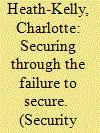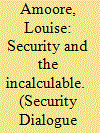|
|
|
Sort Order |
|
|
|
Items / Page
|
|
|
|
|
|
|
| Srl | Item |
| 1 |
ID:
136101


|
|
|
|
|
| Summary/Abstract |
This article argues that popular culture can make an important contribution to security studies, and especially critical security studies, either by offering alternative narratives that challenge the dominant view of security or by deconstructing the process of securitization. It then examines a genre of popular culture that until now has been largely ignored by security studies, noir police procedural novels, and shows how the contemporary police detective can no longer be viewed in the same way as the defender of the status quo depicted in the traditional police procedural. At the same time, he or she does not correspond to the portrait of the security professional, a member of those forces that contribute to the way security is officially defined. He or she has become, instead, a critic of prevailing security practices. To illustrate how this has happened, the article takes novels from two well-known authors of noir procedurals – Faceless Killers by Sweden’s Henning Mankell and Rounding the Mark by Italy’s Andrea Camilleri – and explores how their two very different police detectives, Kurt Wallander and Salvo Montalbano, treat the fears, anxieties and insecurities aroused by immigration in their respective societies and, in doing so, assume in their own way the role of critical security analyst.
|
|
|
|
|
|
|
|
|
|
|
|
|
|
|
|
| 2 |
ID:
136821


|
|
|
|
|
| Summary/Abstract |
Iraq today produces about a million barrels of oil more than it did in the immediate aftermath of the US-led invasion in 2003. In October 2012, the IEA predicted that Iraq’s production could double by 2020. Yet, in spite of the impressive recovery and vast potential of the Iraqi oil sector, its further development is constrained by insecurity, bureaucratic bottlenecks, infrastructure deficiencies, unresolved legal issues, and political disputes with the KRG.
|
|
|
|
|
|
|
|
|
|
|
|
|
|
|
|
| 3 |
ID:
137012


|
|
|
|
|
| Summary/Abstract |
Diverse, sometimes even contradictory concepts and practices of resilience have proliferated into a wide range of security policies. In introducing this special issue, we problematize and critically discuss how these forms of resilience change environments, create subjects, link temporalities, and redefine relations of security and insecurity. We show the increased attention – scholarly as well as political – given to resilience in recent times and provide a review of the state of critical security studies literature on resilience. We argue that to advance this discussion, resilience needs to be conceptualized and investigated in plural terms. We use temporalities and subjectivities as key analytical aspects to investigate the plural instantiations of resilience in actual political practice. These two issues – subjectivity and temporality – form the overall context for the special issue and are core themes for all the articles collected here.
|
|
|
|
|
|
|
|
|
|
|
|
|
|
|
|
| 4 |
ID:
137016


|
|
|
|
|
| Summary/Abstract |
Resilience discourses resignify uncertainty and insecurity as the means to attain security. Security failure is resignified as productive and becomes part of the story about security learning and improvements in anticipatory capability. In this article, I explore questions of failure mediation and ‘securing through insecurity’. If resilience policies suggest that failure and insecurity can be mediated and redeployed in the cause of success, what becomes of visceral sites of security failure such as the terrorist bombsite? This article focuses on a site where security agencies failed to prevent the bombing of a packed nightclub in Bali, in order to explore ambiguity of failure in the resilience era. It considers the efforts of politicians and activists to perform the site as resilient, and the spatial and temporal excess which eludes this performance. The article contributes to critical literatures on resilience by showing, through the ambiguities of resilience at the bombsite, that resilience is a chimera with regards to its supposed incorporation of insecurity.
|
|
|
|
|
|
|
|
|
|
|
|
|
|
|
|
| 5 |
ID:
134473


|
|
|
|
|
| Summary/Abstract |
In this article, I explore a specific relation between mathematics and security calculations. Recalling the confrontations between the mathematician Alan Turing and the philosopher Ludwig Wittgenstein in the 1930s, I am interested in the relationship between intuition and ingenuity. During Wittgenstein’s 1930 lectures on the foundations of mathematics, Turing interjects in order to insist upon the capacity of number: ‘one can make predictions’. Wittgenstein replies that mathematics ‘makes no predictions’, but instead is a form of grammar: ‘taken by itself we shouldn’t know what to do with it; it’s useless. But there is all kind of use for it as part of a calculus’. It is just such a formulation of a calculus or grammar – ‘decision trees’, ‘event trees’, ‘attribute-based algorithms’ – that characterizes contemporary security. As for Turing, the logic comprises ‘two faculties, which we may call intuition and ingenuity’. The intuitive realm of imagination and speculation reaches toward a possible solution, while the ingenuity seeks arrangements of propositions. The advent of ‘rules-based’ and ‘risk-based’ security decisions, then, are always already political because they precisely involve combinatorial possibilities whose arrangement has effects in the world.
|
|
|
|
|
|
|
|
|
|
|
|
|
|
|
|
| 6 |
ID:
134269


|
|
|
|
|
| Summary/Abstract |
Romania and South Korea were once among the top sending countries for adoptive American families. In recent years, though, both have adopted significant restrictions on intercountry adoption. What leads countries to introduce such severe restrictions? This article argues that shame plays a significant, yet underappreciated, motivating factor for leading governments to change their laws on intercountry adoption. Political leaders seize on nationalist rhetoric to argue that intercountry adoption is shameful. The article explores the interaction between intercountry adoption and shame through brief case studies on Romania and South Korea. Finally, it examines the role of the Hague Convention on Protection of Children and Cooperation in Respect of Intercountry Adoption (Hague Adoption Convention) in ameliorating these feelings.
|
|
|
|
|
|
|
|
|
|
|
|
|
|
|
|
|
|
|
|
|